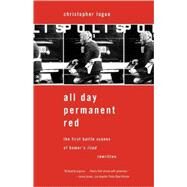All Day Permanent Red The First Battle Scenes of Homer's Iliad Rewritten
, by Logue, Christopher- ISBN: 9780374529291 | 0374529299
- Cover: Paperback
- Copyright: 6/23/2004
Setting down her topaz saucer heaped with nectarine jelly, Emptying her blood-red mouthset in her ice-white face Teenaged Athena jumped up and shrieked: "Kill! Kill for me! Better to die than live without killing!" Who says prayer does no good? Christopher Logue's work in progress, his Iliad, has been called "the best translation of Homer since Pope's" (The New York Review of Books). Here inAll Day Permanent Redis doomed Hector, the lion, "slam-scattering the herd" at the height of his powers. Here is the Greek army rising with a sound like a "sky-wide Venetian blind." Here is an arrow's tunnel, "the width of a lipstick," through a neck. Like Homer himself, Logue is quick to mix the ancient and the new, because his Troy exists outside time, and no translator has a more Homeric interest in the truth of battle, or in the absurdity and sublimity of war. Christopher Logueis a screenwriter, a film actor, and the author of several books of poems. He lives in London. ALos Angeles TimesBest Book All Day Permanent Redis the fourth book in Christopher Logue's brilliant and ongoing translation of Homer'sIliad. Logue's work in progress, a free-ranging, decidedly modern version of the epic that has been unfolding for decades, has been called "the best translation of Homer since Pope's" (The New York Review of Books). In this volume of rugged, intense, descriptive verse, we witness the first clashes of the two armies. Here we encounter the doomed Hector, a lion-warrior, "slam-scattering the herd" at the height of his powers. Here we find the Greek army rising to its feet with the sound of "a raked sky-wide Venetian blind." And here we glimpse a single arrow's tunnel-like wake, "the width of a lipstick," as it cuts through a man's neck. Much like Homer himself, Logue is quick to mix the ancient and new, the sacred and profane, the lyrical and gruesome. Moreover, Logue's narrative poem occurs, as does Homer's, in a Troy that exists outside of time--a classical, eternal terrain. Like no other translator or scholar ofThe Iliad, Logue exhibits a truly Homeric interest in, and sensitivity to, the universal or mythic truths of battle--and the absurdity and sublimity of war. "The mounting pressure of a city siege, two politician-generals invoking gods, the amount of dust in the Middle East--this version of the first skirmishes in theIliadhas the immediacy of an embed's dispatches . . . [Logue's] verse displays a gift for the unexpected simile . . . The music [of his poetry] is wild and improvisational."--The New Yorker "Logue breathes more life into Homer than just about anyone working in English. Candidly ignorant of Greek, he is free of the need to be faithful or even adequate to the original, focusing on the English results. And the results are impressive. Few have made of classical poetry something as vital and immediate. Logue is able to capture the strangeness and sinew of Homer in a distinctively contemporary voice . . . Logue's ear is fine and he has produced passages of remarkable poetry . . . [This] book is thrilling to read, and gives us theIliadin startling and fresh ways."--John Tipton,Chicago Review "Brilliantly original, consummately crafted English verse, dominated but by no means constrained by iambic pentameter and, secondarily, fabulous Homer . . . The cumulative effect is to bring the ethos of Homer to life for English speakers with a vigor and immediacy that surpasses every available modern translation. Logue's Homer satisf







